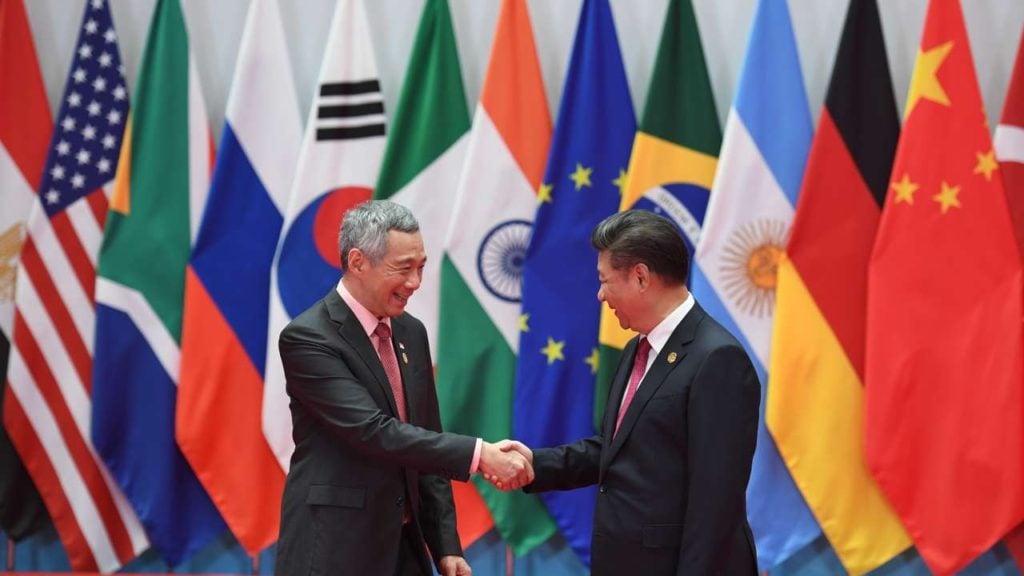
(Associated Press)
Not long ago, a war of words between the Singaporean Ambassador to China, Stanley Loh, and the chief editor of Global Times, Hu Xijin, broke out. The incident provided a rare opportunity to observe the characteristics of the two countries’ thinking and logic in recent years.
The fuse of the polemic was a relatively small, technical issue with limited relation with international pattern, yet the story must begin from here. Earlier this year in July, Laos, as the rotating presidency of ASEAN, submitted a request to Iran, the rotating presidency of the 17th Non-Aligned Movement Summit. It hoped to revise the ‘Southeast Asia’ paragraph of the draft Final Outcome Document, stating the increasingly serious concern of some leaders and ministers to the South China Sea situation.
However, the new rotating presidency and China’s ally Venezuela rejected the amendment. Thus, ASEAN wrote to the Foreign Affairs Minister of Venezuela, stating ‘ASEAN expressed reservations about the existing paragraph on the South China Sea issue and said that it could not reflect the ASEAN position and hoped that the General Assembly would record the attitude of ASEAN and the earlier request for revision of that paragraph by way of an annex.’.
Nevertheless, Global Times published a report on the summit with a title ‘the Non-Aligned Movement summit closed, Singapore highlighted the South China Sea arbitration regardless of opposition’. Singaporean ambassador to China accused that the report was not true, yet the editor of Global Times, Hu Xijin insisted that the report was true, and expressed dissatisfaction with Singapore’s foreign policies.
To break down the debate, Global Times’ reported that Singapore has made a request on the Non-Aligned Movement summit for the strengthening of the South China Sea paragraph on the Outcome Document for its own interests when ‘many countries’ expressed opposition, reflecting that the South China Sea arbitration was ‘not popular’ in the international community.
Secondly, Singapore has challenged the authority of the rotating presidency Venezuela, delaying the progress of conference, making many member states feeling uneasy, hence showing a disrespect for international rules. It is particularly noteworthy that Hu Xijin said that the Global Times has made these reports based on the information provided by the ‘informed sources’ who attended the summit, insisting that the report was not fabricated. This position was confirmed by the spokesman of the Chinese Ministry of Foreign Affairs (who said ‘the truth is very clear’). It seems that these reports are not without official involvement.
Of course, the biggest message behind the report is not within these details. In fact, the main reason behind China’s discontent is how Singapore openly sided with the United States to put pressure on China over the South China Sea issue. Aside from Global Times’ usual style of writing which includes all kinds of negative, subjective and emotional words, it seems that it also decontextualized the details into a large framework of established view, and the main audience for the polemic is not international readers but the Chinese domestic readers.
Although Singapore is also a Chinese-majority country, its official routine is the opposite of China. Singaporean Ambassador to China, Stanley Loh, made his counterargument based on the following points. Firstly, he pointed out that ‘Emphasizing the South China Sea issue’ is not Singapore’s claim but the consensus of the ASEAN Summit. It is reckless for China to specifically single out Singapore for the collective decision of ASEAN. Besides, there were only a few non-Southeast Asian countries that opposed this on the summit, quite the opposite with what Global Times described.
Singapore also stressed that is its common practice for countries of the relevant region to make their own decisions on the amendments to the draft outcome document of the Non-Aligned Movement Summit. Thus, the request of Singapore on behalf of ASEAN countries was not unusual. Yet it was rare this time that Venezuela rejected the collective request of the ASEAN due to the pressure of a few ‘extraterritorial countries’, hinting that the Global Times report is an accusation made by the offender itself.
Thirdly, Singapore stressed that its ‘consistent position’ on the South China Sea issue had not changed. That was, it hoped to enhance mutual understanding with China on this matter and jointly promote China-Singapore relations development, etc. It also made a sarcastic statement that Global Times’ “escalation of issues” is simply a misread of Singapore’s response.
From this, we could see that Singapore is mechanically describing facts, emphasizing the fact on documents and legal details, and to avoid making any political statements in order to win the moral high ground of reason. The target audience is domestic readers, the ASEAN member states, and the international community.
However, Singapore has indeed avoided answering Beijing’s most concerned question: Singapore does hold certain attitude on the controversial South China Sea issue and actively support the United States in keeping its force in this region. Diplomatic issues like the South China Dispute is simply impossible to be solved by a game of word. We can expect that similar cases would come one after another in the coming days.